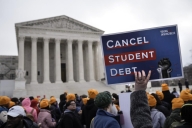You have /5 articles left.
Sign up for a free account or log in.
A newly public Consumer Financial Protection Bureau analysis of campus-sponsored debit cards found that students at colleges paid to promote the cards were charged on average three times more in account fees than student account holders elsewhere.
The Education Department received the analysis nearly a year ago, but it was only released last week in response to Freedom of Information Act requests for the documents. The findings raise questions about conflicts of interest arising from financial relationships between banking entities and the colleges that promote their student accounts, the agency said in its report.
But the analysis also suggests that cash management regulations issued by the Education Department in 2015 have already had a significant positive impact for students.
“The CFPB report shows that the cash management regulations are working,” said Nathan Arnold, a senior adviser at Education Counsel and former Education Department official who helped write the rule. “It shows that overall fees are down in the market, especially compared to prior to the cash management regulations. The worst actors are also no longer operating or are charging a lot less than they used to.”
Under the Obama administration, the market for college-sponsored deposit and prepaid accounts became a serious focus for the department, thanks in part to an investigation by a watchdog group that found student aid recipients were losing hundreds to fees on bad deals their colleges had with credit card companies.
The cash management rules barred companies contracted by colleges to process student aid payments and other functions from charging fees to students. And beginning in 2017, colleges with those marketing agreements were required to start reporting information like student enrollment in the accounts, fees charged and financial compensation to the school.
Most students at the majority of the 573 colleges where CFPB analyzed card agreements paid no fees in the 2016-17 academic year. But the fees paid by students varied quite a bit among those companies that did charge students -- from less than a dollar to nearly $47 annually.
And while students paid more than $27 million in fees, the worst practices identified by consumer and watchdog groups have largely been banned, and fees are mostly in line with the general debit card market.
The consumer group U.S. PIRG in a 2012 report identified hundreds of agreements between banking entities and colleges that in many cases steered revenue to campuses but also included some steep fees for students. Higher One, the company that the group identified as the biggest player in the market, generated about 80 percent of its revenue from student fees, the group found.
But the company, now known as BankMobile, charged relatively modest annual fees on average -- just over $12 a year -- according to the CFPB analysis.
Wells Fargo, which holds more than 300,000 student accounts, charged the highest average fees annually, the agency found, at $46.99. The company with the second-highest average annual fees, University of Kentucky Federal Credit Union, charged students an average of $37 in a 12-month period. It also held only 2,570 student accounts, a small proportion of the overall market.
Senator Dick Durbin, an Illinois Democrat, earlier this year raised concerns about fees charged to students at colleges partnering with the company. A company spokesman said in response to scrutiny from Durbin that fees could be higher depending on the concentration of nontraditional or part-time students on a campus.
Stacy Kika, a spokeswoman for Wells Fargo, said students have the ability to opt in to campus cards at participating colleges. And she said fees can be incurred depending on how customers use their accounts, including whether they withdraw money from ATMs outside the bank's networks, send wire transfers or purchase money orders. (Note: This story was updated to include comments from Wells Fargo.)
"Banking with Wells Fargo provides these customers with access to a wide array of resources to help them with their daily money management and planning," she said.
The cash management rule was never intended to stop banks from charging fees on student accounts entirely.
Arnold said that new public data on account fees will give colleges ammunition to demand better deals for students.
“Schools have more leverage in these agreements than they realize,” he said. “This report shows that they can get a better deal for students if they negotiate. And it shows all the competitors they could be negotiating with if they think they're getting a bad deal.”
But Seth Frotman, the former student loans ombudsman at CFPB, said the data the agency collected shows the need for tough enforcement from the department as well.
“No bank is giving a school money for free,” he said. “When money flows from banks to schools, it’s students who are the ones paying the price.”
Frotman noted that Wells Fargo, which held less than a quarter of student accounts, charged almost half of all fees to students.
CFPB provided the analysis to A. Wayne Johnson, the chief strategy and transformation officer at the Education Department, in February as the department developed plans to pilot its own prepaid card for student aid recipients. One of the biggest selling points Johnson has offered for a department-issued debit card is that it would have zero fees for students. And the CFPB analysis “confirmed for us the importance of a fee-free payment card option for students,” said Liz Hill, a department spokeswoman.
Colleen Campbell, associate director for postsecondary education at the Center for American Progress, said if the department’s focus is on lowering fees for students, “you have the cash management regulations to enforce.”
Arnold said if the department can set up a prepaid card that’s a good deal for consumers, it would be welcomed to the market of campus-sponsored accounts.
“But it looks to me like the market already has a lot of really solid competition that is serving students well,” he said.








